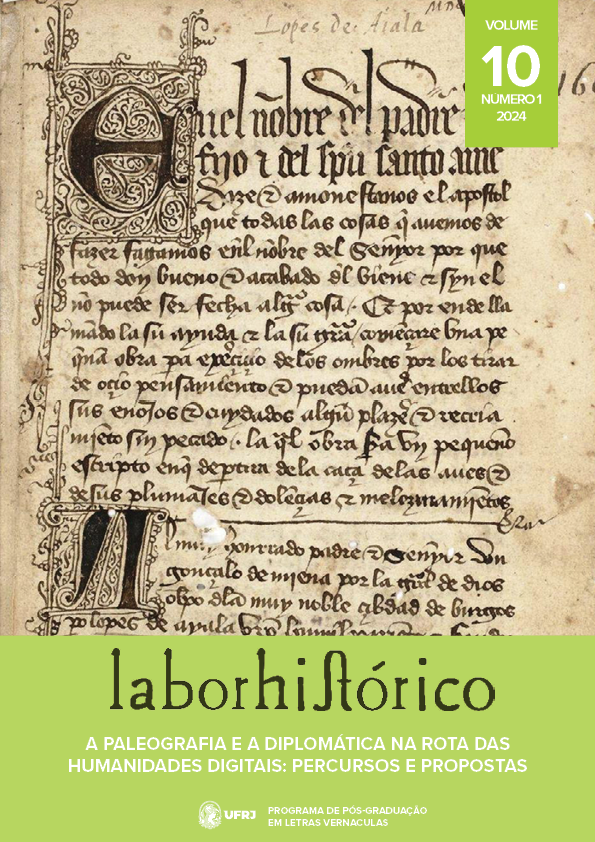Digital resources as the basis of a teaching-learning experience in medieval studies in an essay format
DOI:
https://doi.org/10.24206/lh.v10i1.63286Keywords:
Humanidades digitais, Recursos de investigação, Ensino-aprendizagem, Idade Média.Abstract
The popularization of internet accessibility has modified, since a long time, the work and the activity of the historian, both in terms of research, knowledge dissemination, and teaching-learning process. The unquestionable interest of the so-called digital humanities urges us to the debate on what appears as a new paradigm also for medievalists. The exposure to the digital humanities constitutes a transformative challenge significant at the deepest level of historiographic production. Taking these assumptions into account, this essay is supposed to give a reflection on the relevance of the digital resources as a condition for the research and the knowledge production in the area of medieval studies.
Downloads
References
ADEMA, Janneke; HALL, Gary (2016). Posthumanities: The Dark Side of The Dark Side of the Digital. Disrupting the Humanities: Towards Posthumanities. The Journal of Electronic Publishing, vol. 19, Issue 2. https://doi.org/10.3998/3336451.0019.201
BERRY, David Michael; FAGERJORD, Anders (2017). Digital Humanities: Knowledge and Critique in a Digital Age. London: Polity.
DOUEIHI, Milad (2012). Pour un humanisme numérique, Publinet. ISBN: 978-2-8145-0641-1.
FERNÁNDEZ IZQUIERDO, Francisco (2006). Investigar, escribir y enseñar historia en la era de Internet. Presentación. Hispania. Revista Española de Historia, vol. LXVI, nº 222, enero-abril, p. 11-30.
GARDINER, Eileen; MUSTO, Ronald G. (2015).The Digital Humanities: A Primer for Students and Scholars. Cambridge: Cambridge University Press. ISBN 978-1-107-01319-3.
GOLD, Matthew K.; KLEIN, Lauren F. (ed.) (2016). Debates in the Digital Humanities. University of Minnesota Press.
HSU, Wendy F. (2016). Co-Working with the Public: Lessons on Public Humanities from the Civic Sphere. In: GOLD, Matthew K.; KLEIN, Lauren F. (ed.). Debates in the Digital Humanities. University of Minnesota Press, p. 280-287.
Journal of the Association for History and Computing, 1998-2010. Disponível em: https://quod.lib.umich.edu/j/jahc/
Le Médiéviste et L’ordinateur, 1979-2003. Disponível em: https://www.persee.fr/collection/medio/.
MATTOSO, José; ROSA, Maria de Lurdes; SOUSA, Bernardo Vasconcelos e; BRANCO, Maria João (ed.) (2011). The Historiography of Medieval Portugal, c. 1950-c.2010: a collective book and a collaborative project. Lisboa: Instituto de Estudos Medievais da Universidade Nova de Lisboa.
MINUTI, Rolando (2001). Internet e il mestiere di storico. Riflessioni sulle incertezze di una mutazione. Cromohs, 6, p. 1-75.
POSNER, Miriam (2016). What’s Next: The Radical, Unrealized Potential of Digital Humanities. In: GOLD, Matthew K.; KLEIN, Lauren F. (ed.). Debates in the Digital Humanities. University of Minnesota Press, p. 32-40.
RIESCH, Hauke; POTTER, Clive (2013). Citizen science as seen by scientists: Methodological, epistemological and ethical dimensions. Public Understanding of Science, vol. 23, issue 1, p. 107-120. https://doi.org/10.1177/0963662513497324
SMULYAN, Susan (ed.) (2020). Doing Public Humanities. Routledge.
Downloads
Published
Issue
Section
License
Copyright (c) 2024 Paula Pinto Costa

This work is licensed under a Creative Commons Attribution-NonCommercial 4.0 International License.
Authors who publish with this journal agree to the following:
a. The authors hold copyright of the published papers; authors are the sole responsible party for published papers content; the published paper is licensed under a Creative Commons Attribution-NonCommercial 4.0 International License which allows the sharing of the publication as long as there is acknowledgement of authorship and publishing by Revista LaborHistórico.
b. Authors should seek previous permission from the journal in order to publish their articles as book chapters. Such publications should acknowledge first publishing by LaborHistórico.
c. Authors may publish and distribute their papers (for example, at institutional repositories, author's sites) at any time during or after the editorial process by Revista LaborHistórico.


